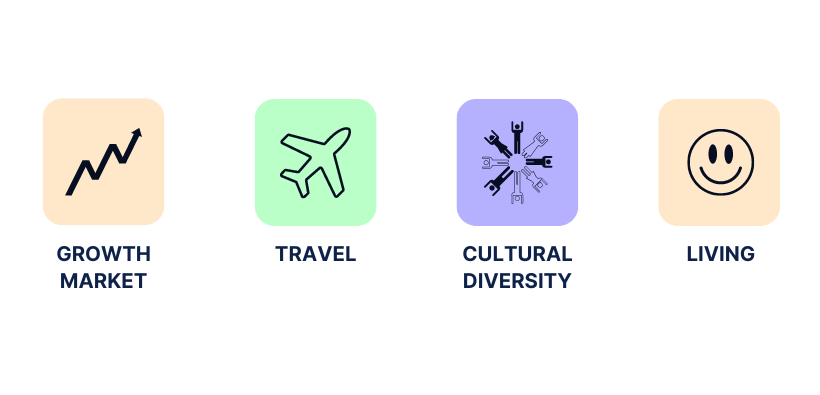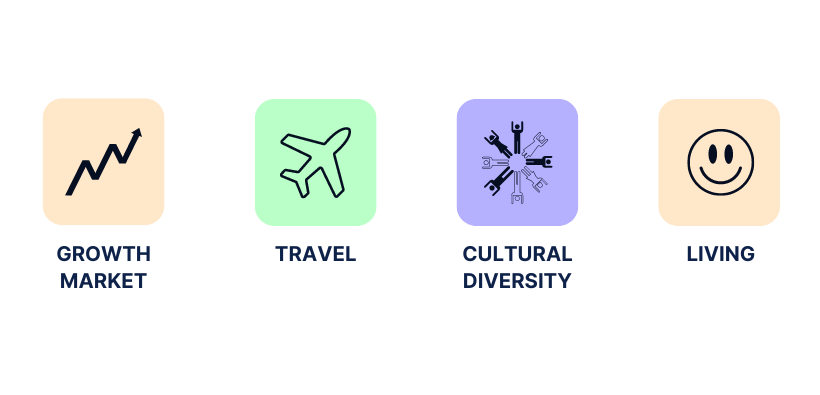Growth Market & Interesting Projects
The context of consulting in SEA has several interesting implications to the nature of the work that makes it structurally different from the industry in other more developed countries.
Firstly, consulting in SEA is still nascent compared to regions like North America or Europe, where the industry has had a significantly longer history. MBB only entered SEA in the 1990s, decades after these firms had already been operating in other markets.
Secondly, aside from Singapore, most of the other countries in SEA are still considered to be developing countries. This is a region that is characterized by rapid economic growth and rising affluence.
- GDP: Indonesia's GDP per capita is about $~5,000, and Vietnam's is approximately ~$3,000. These figures are considerably lower compared to developed markets such as the United States (~$65,000) and Germany (~$47,000). However, GDP growth is high in this region, with many SEA countries exhibiting robust GDP growth rates. For example, Vietnam's GDP growth has averaged around 6-7% annually in recent years, while Indonesia's growth has been around 5%. In contrast, GDP growth rates in developed regions like the European Union and the United States are typically lower, averaging around 1-2% annually.
- Rising Middle Class: The middle class in SEA is expanding rapidly. By 2030, it is estimated that over 65% of SEA's population will be part of the middle class, driving consumer demand and demand for new infrastructure, products and services.
The 2 dynamics described above thus have an implication on several key aspects of the work in SEA:
Senior exposure:
- Because consulting is still a nascent market, often you will deal more immediately with senior stakeholders higher up in the corporate hierarchy, versus what you might experience developed markets. For example, it is not uncommon for a sponsor (buyer) of a project to be a division or business unit head in a more mature market, but in a nascent market often the CXO level makes the decision directly and is often engaged more intensely in the projects
Type of projects:
- In nascent economies (and companies), ‘growth’ as a theme becomes much more salient, and this translates also to the type of projects that you may undertake. Growth strategy, market entry, new products and services (to target the rising affluence and growing demand) are not uncommon projects in SEA
- There is also opportunity to work on interesting projects unique to SEA that at times have the potential to shape the countries’ trajectories. For example, financial inclusion is a key challenge in SEA. A fair portion of the population are unbanked, or do not have a credit score. Consulting firms have been known to work with FinTechs and banks in the region to help progress the financial landscape.
- Similarly, governments in SEA, who may also be potential clients of firms, face key developmental challenges along healthcare, education etc – and these are the topics that they will engage consulting firms for advice on
Travel in Southeast Asia
One of the unique aspects of consulting in SEA is the extensive travel involved. Many top firms operate in SEA as a single system, with the staffing pool being an SEA-wide staffing pool. This means that as a consultant within one of the SEA offices, you have the potential opportunity to work on any project within SEA.
Therefore, as a consultant in SEA, it is not uncommon to travel frequently between countries for projects. For example, in my own time in consulting, I had spent >50% of my time outside of my ‘home’ office on projects in other SEA countries.
The frequent travel is enabled by SEA being well connected between the countries. For example, there are approximately ~40 flights daily between Kuala Lumpur and Singapore, and about ~20 flights daily between Kuala Lumpur and Jakarta.
While the opportunity to travel for work is something many look forward to, travelling in the region also has its drawbacks and challenges. Infrastructure is often not great especially in some of the more developing countries, and you may have to deal with long immigration queues, traffic and long commutes from the airport to the city and to the client site.
Cultural Diversity
Since you may be staffed in any one of the SEA countries on a project, you will be exposed to a wide range of cultural backgrounds as you work with different local clients. While there are several benefits to this exposure, it also comes with its unique challenges:
Benefits of working in SEA from a cultural diversity POV
- Build interpersonal skills: Exposure to diverse cultures and ways of working broadens a consultant's perspective ability to adapt to different inter-personal situations
- Networking: The exposure also allows you to building diverse relationships across cultures can lead to a robust professional network
Challenges of working in SEA from a cultural diversity POV
- Communication barriers: Language differences can pose communication challenges, typically for local firms with less international staff
- Cultural misunderstandings: Working in a new country and with new local clients with different cultural backgrounds and ways of working can lead to friction in interactions
At MBB, the default norm for working language is still English, but it is not uncommon to have a second translated version of the decks to a local language. As a consultant in SEA, knowing a local language is often a key advantage during the application stage to get into a specific office, and depending on project circumstances also an advantage or requirement to being staffed on certain projects. Furthermore, it is important to remember to spend time to understand the local culture and ways of working before each project.
Living
Living in SEA offers consultants a unique opportunity to immerse themselves in diverse cultures and environments. There are several pros and cons if you are going to live in SEA:
Pros:
- Diverse environment: The region's rich cultural tapestry provides a vibrant and dynamic living environment with different cultures, cuisines, festivities, architecture and spaces
- Cost of Living: Excluding Singapore, cost of living in SEA is lower compared to many developed countries. Many countries have affordable food, housing and everyday expenses
- Travel Opportunities: Being based in a region that is well connected by air travel also has its advantages outside of the work context. Consultants in SEA have ample opportunities to explore different countries and locations during weekends or during holidays, with national carriers but also well-established low-cost carriers (e.g. AirAsia, Scoot, LionAir) serving many routes. There are ample opportunities to explore both bustling urban cities, as well as beautiful natural attractions (SEA is known to be one of the best scuba diving spots in the world)
Cons:
- Infrastructure: Infrastructure is often not as advanced, leading to inconveniences. Traffic and pollution are known problems in the key urban cities
- Cultural & language barrier: While English is getting more prevalent in the region, language barriers can be a significant hurdle, and not being fluent in the local language might make daily interactions and bureaucratic processes difficult
- Healthcare: Quality of healthcare can vary significantly between countries, with some countries like Singapore and Thailand having a higher standard than other countries
- Climate: The hot and humid climate can be challenging for some individuals, although this can also be a pro for those who are seeking to avoid cold climates!








